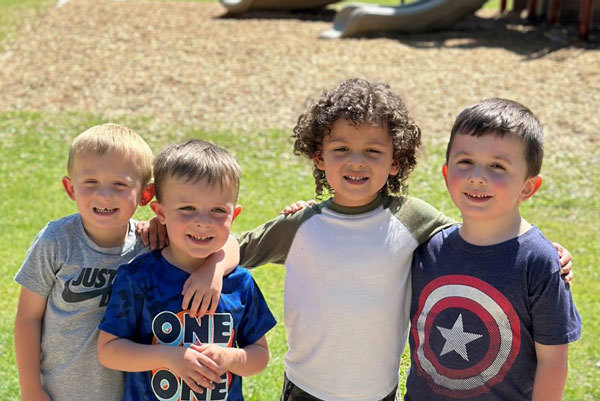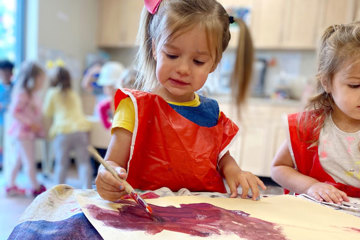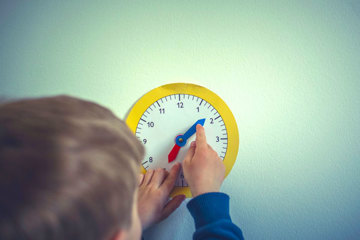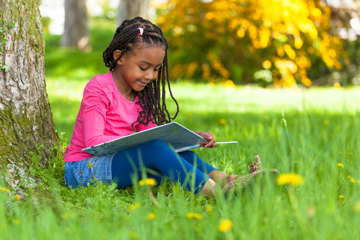4 Simple Ways to Build Your Child’s Social Skills for Kindergarten

As your child approaches Kindergarten, the idea of “school readiness” can start to feel a little overwhelming. You might find yourself wondering, “Will my child be okay?” or “Are they ready for this next step?” You're not alone—these are common concerns for many parents.
But what does school readiness really mean?
While many people associate readiness with academic skills, most experts agree that social and emotional development are just as important—if not more so. A child’s ability to understand feelings, navigate relationships, and solve problems plays a huge role in their classroom success.
Here are four important social-emotional skills—and easy ways you can help your child build them at home.
1. Help Your Child Identify and Regulate Emotions
Understanding and managing emotions is a key part of school success. A child who can identify when they’re angry—and express that anger in a healthy way—is better equipped to handle the ups and downs of a school day.
Try these strategies at home:
- Name the feeling. When your child is upset, help them label the emotion: “You seem frustrated. Do you feel like you’re not being heard?”
- Use books and pictures. Pause during storytime and ask, “How do you think this character feels? Why?” This helps your child practice empathy and emotional recognition.
- Model emotional regulation. Children learn by watching. Let them see you navigate and express your own feelings in a healthy way. For example, you could say, “I’m feeling a little overwhelmed, so I’m going to take a deep breath.”
2. Encourage Positive Relationships
In the classroom, children spend hours interacting with other children and adults. They don’t need to be best friends with everyone—but they do need the tools to be courteous and kind to others.
Help your child build these skills:
- Set up social opportunities. Arrange playdates, story times, or group activities. Afterward, talk about ways you saw your child being a good friend: “I noticed you shared your toy—how did that feel?”
- Read books about friendship. Sharing stories that show children in social situations can open the door to conversation about kindness, inclusion, and respect. Talk about how the characters are building positive relationships with others or discuss alternative behaviors when characters aren't showing these skills.
Books like Best Friends by Miriam Cohen, Margaret and Margarita by Lynn Reiser, Jamaica’s Find by Juanita Havill, and This Is Our House by Michael Rosen are wonderful stories that explore these themes.
3. Teach Patience and Perspective
At school, your child will quickly discover they are one of many—and that their needs won’t always come first. As family members, it’s difficult to prepare children for this. However, these moments of waiting and turn-taking are valuable learning opportunities.
To support this:
- Use everyday moments. Waiting at the doctor, standing in line at the grocery store, or having to wait for a story while dad bathes the baby. These situations call on children to balance their own needs and desires with those of others. Acknowledge the challenge and offer encouragement: “You’re being so patient. Let’s count how many people are ahead of us!”
- Create social stories. Make a homemade book together like “When I Have to Wait” or “Sometimes We Share” and read it regularly in the weeks leading up to kindergarten.
4. Build Problem-Solving Skills
In a classroom, it’s inevitable that conflicts will arise. One of the greatest gifts you can give your child is the ability to resolve social problems calmly and respectfully. As a child grows, it’s important that adults take a step back and give him time and space to solve problems, coaching him in techniques such as negotiation, collaboration, compromise, and perspective-taking.
Help them grow in this area by:
- Talking through story problems. Children’s books can play an important role in helping young children gain social skills. While reading a story, pause when the character faces a problem. Discuss how the character might solve the problem. Dissect both your idea and the resolution at the end of the story. What might have happened if the character used your ideas?
- Model appropriate problem-solving techniques. Say things like, “We both want the last cookie. What’s a fair way to decide?” Let your child see that there’s often more than one good solution. Your child will learn to identify and evaluate solutions as they navigate our complex social world.
As adults, we often give children practice in the physical and academic skills they need to be ready for school. But it’s just as important to help them develop social skills. A child competent in these skills is a child more likely to be school ready!
Have a question about parenting, child development, or early education? We’d love to hear from you! Email us at hello@sshouse.com.


